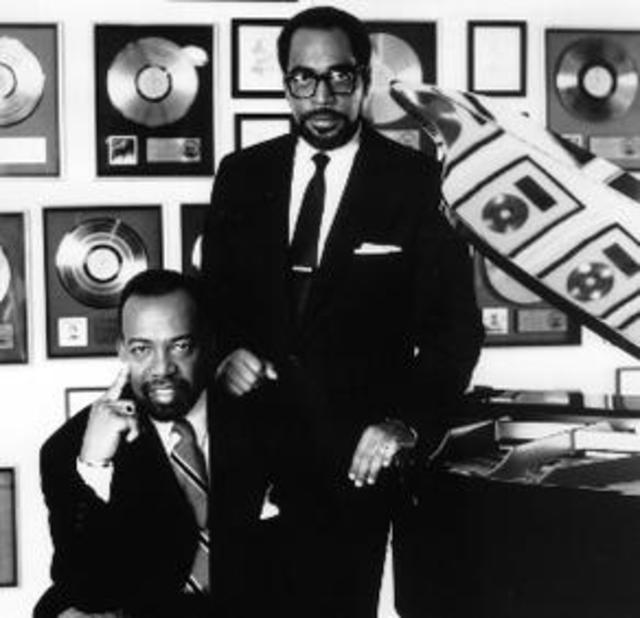Kenny Gamble and Leon Huff

Kenny Gamble (production, songwriting, vocals; born August 11, 1943), Leon Huff (production, songwriting, keyboards; born April 8, 1942)Kenny Gamble and Leon Huff were the architects of the Philly Soul sound. Working jointly on songwriting and production, they made Philadelphia the capital of soul music in the Seventies. Gamble and Huff generated a profusion of soulful hits that had a colorblind appeal. They worked with the O'Jays, Harold Melvin and the Blue Notes, the Intruders, the Three Degrees, McFadden & Whitehead, Jerry Butler, Lou Rawls, Dee Dee Sharp, Phyllis Hyman and others. Their biggest hits, topping both the R&B and pop charts, were jazz singer Billy Paul's "Me and Mrs. Jones"; the O'Jays' "Love Train"; and the Soul Train theme, "TSOP (The Sound of Philadelphia)," by MFSB Featuring the Three Degrees. All totaled, Gamble and Huff were behind 15 gold singles and 22 gold albums (8 of which went platinum).The duo launched Philadelphia International Records label in 1971, giving Motown a run for its money – in terms of sales and influence – in the Seventies. Gamble and Huff's sophisticated sound included glossy orchestrations; guitars that played glistening octaves or rhythmic chords; jazzy vibes and smooth, grooving saxes; and a memorable lead voice atop satiny group harmonies. Many of Gamble and Huff's best-known songs - such as the O'Jays' "I Love Music" and Harold Melvin and the Blue Notes' "The Love I Lost" – were driven by smooth, pulsing disco rhythms. Just as often, Gamble and Huff would write a slow jam topped by a beseeching vocal or rap (such as Teddy Pendergrass' wrenching lead vocal on the Blue Notes' "If You Don't Know Me By Now"). Social commentary and harmony-minded themes frequently found their way into Gamble and Huff's songwriting, particular for the O'Jays (who scored with "Back Stabbers," "For the Love of Money" and "Love Train")."We wanted to take social themes and translate them to commercial recordings," Kenny Gamble said in 1988. "Philadelphia International was about spreading love."The roots of Gamble and Huff date back to Kenny Gamble and the Romeos, a late-Fifties group that included keyboardist Thom Bell, who would become an important arranger at Philadelphia International. Leon Huff, who also played keyboards, joined the Romeos later on. The group performed around Philadelphia and the Delaware Valley, and they backed Chubby Checker and others on tour. Gamble also ran a record store, while Huff did session work for Phil Spector and the Ronettes, among others. Both men had a broad exposure to all aspects of the music business in their formative years.Gamble and Huff's first self-penned and self-produced Top 10 hit was "Expressway to Your Heart," by the Soul Survivors, a blue-eyed soul band with ties to Philadelphia. The duo also worked with Wilson Pickett, Dusty Springfield, Archie Bell and the Drells, and others. Another breakthrough was "Only the Strong Survive," which revived singer Jerry Butler's career.Gamble and Huff founded the Gamble and Neptune labels, where they recorded Bunny Sigler ("Let the Good Times Roll"), the Three Degrees, jazz-soul singer Billy Paul and the Ohio-based O'Jays. In 1971 they struck a deal with Columbia Records' Clive Davis resulting in major-label distribution for their new label, Philadelphia International Records It turned out to be a phenomenal launching pad for their artists, songs and productions. The label's first hit was the O'Jays' "Back Stabbers" (#1 R&B, #3 pop). Close on its heels came Bill Paul's "Me and Mrs. Jones" (#1 pop, #1 R&B) and "If You Don't Know Me By Now," by Harold Melvin and the Blue Notes (#3 pop, #1 R&B).Gamble and Huff synthesized elements from different eras of soul music - notably, the sweet harmonies of Fifties doo-wop and the gruff, gospel-inflected singing of Sixties soul men. Just as Motown had the Funk Brothers, Stax had Booker T. & the M.G.'s, and Phil Spector had the Wrecking Crew, Gamble and Huff assembled an in-house band dubbed MFSB ("Mother, Father, Sister, Brother"). That name emphasized the family-oriented philosophy of Gamble and Huff. Other important members of Gamble and Huff's team were arranger/orchestrators Thom Bell and Bobby Martin; artists, producers and songwriters Gene McFadden and John Whitehead; guitarist Roland Chambers, a former member of the Romeos; and engineer Joe Tarsia, who manned the board at Sigma Sound, the studio where many of Gamble and Huff's greatest sessions occurred.In 1989, Gamble and Huff won a Grammy for Best R&B song, "If You Don't Know Me By Now" (for the remake by Simply Red). The duo received the Grammy's prestigious Trustees Award in 1999. Their sons - Caliph "Poppa Chief" Gamble, Salahdeen Gamble and Leon A. "Pops" Huff II – entered the family business in the Nineties, working with contemporary R&B and hip-hop acts for a revived Philadelphia International Records.Ultimately, what Kenny Gamble and Leon Huff were selling, using the medium of well-crafted, danceable and urbane soul music, was a message of "peace in the world, people getting together," Gamble told writer Chuck Miller in 1998. "That's what our whole thing was, [what] all our music was about: people uniting, living together in peace and harmony and having fun.""Dignity and integrity and, finally, salvation are Gamble and Huff's great themes," wrote David Ritz in his liner notes for The Philly Sound box set. "Like Curtis Mayfield and Marvin Gaye and Stevie Wonder, they move from the material to the metaphysical."